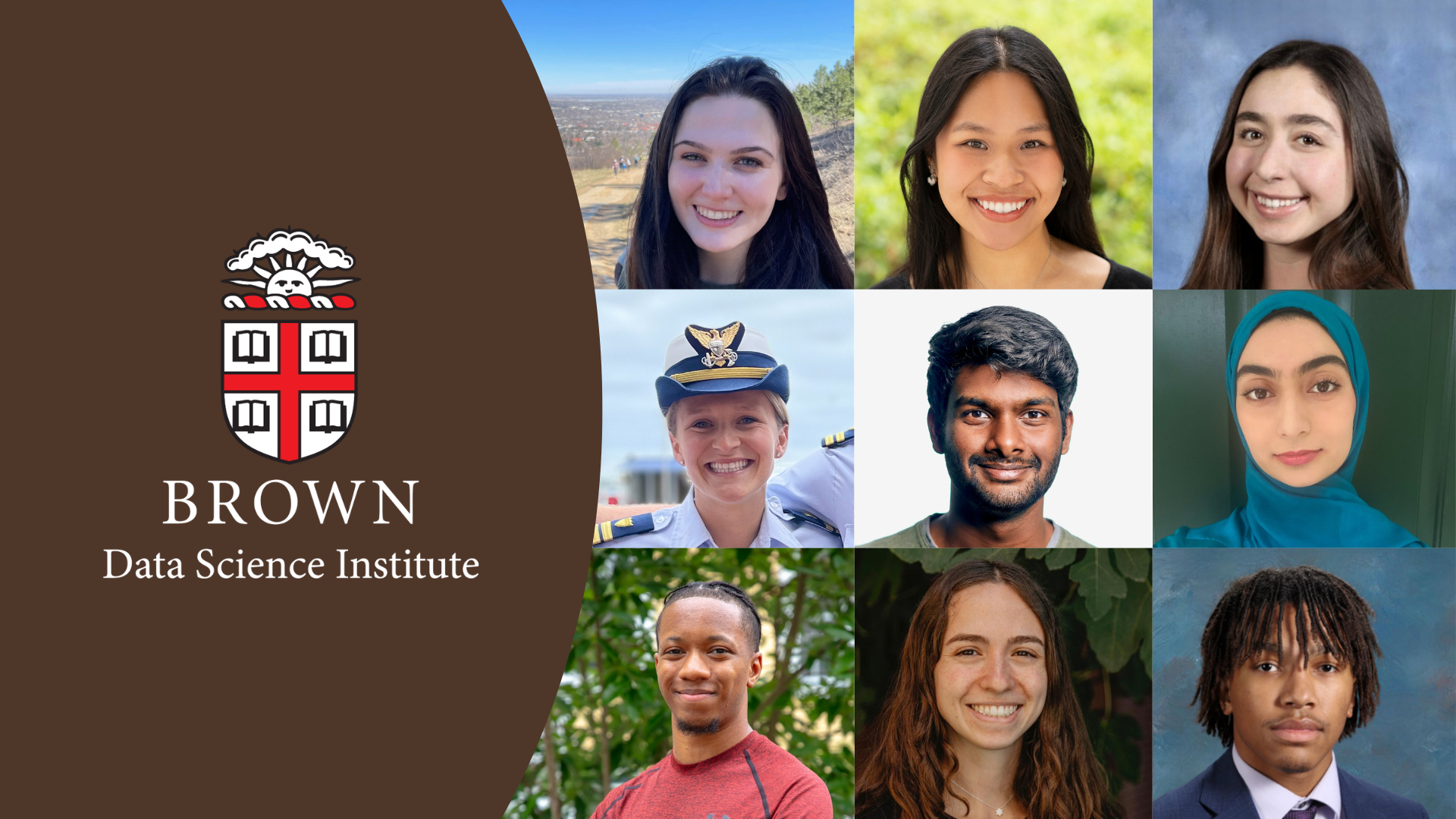
2025 Graduating Student Spotlights
DSI is home to multiple undergraduate and graduate academic programs, each with passionate and inspiring students. Hear from some of our graduating students and explore what has inspired them at Brown.

Data Fluency Certificate Graduates
Why did you pursue the Data Fluency Certificate?
As I pursued my coursework and extracurricular activities at Brown, I realized everything I did was facilitated by the knowledge of Data Science. The world around us is made up of data, and that data tells a story. I wanted to be able to understand that story—to take all of the information around me that seemed like just numbers and transform it into something meaningful. I believe my work in the Data Fluency certificate allowed me to not only gain a deeper understanding of data science but to fully make sense of the way data science is used in Cognitive Science and other fields as well.
What has been your favorite course at Brown?
One of my favorite courses at Brown was CLPS 0500 Perception and Mind. This is the first course I took within the Cognitive Science concentration, which inspired me to pursue the concentration. The course is all about how we see and perceive the world—I found it fascinating! Another one of my favorite courses was CLPS 0220 Making Decisions. This course talks about the mechanisms behind why we make the choices we do. I find myself thinking about it often, even to this day.
How have your academic interests changed over the course of your time at Brown?
My academic interests have changed a lot over the course of my time at Brown. I began my time here thinking I was going to concentrate in International Relations. However, after taking a few courses in the CLPS department, I realized I was fascinated by the way the human mind works. I also had no idea I was going to pursue the Data Fluency Certificate. But as I moved through my coursework, I came to understand how important it is to be able to look at data and understand what it is trying to say—a skill necessary in so many of my courses. As soon as I began to pursue the certificate, I loved it. Each course taught me something important about the world of data—whether that was the ethics of working with data or more technical skills in Python. I even worked as a Teaching Assistant for one of the courses in the DATA department. I know these skills will be applicable in whichever path I take after graduation.
What has been your favorite part of being a student at Brown?
One of my favorite parts about being a student at Brown is the ability to pursue absolutely any interest. I don’t think I would have discovered my passion for Cognitive and Data science had it not been for the opportunity to take classes in any department. Because of the flexibility of the open curriculum, I was also able to engage with many other passions of mine—taking classes in the arts and languages departments as well.
What research experiences have shaped your time at Brown?
During my time at Brown, I worked in two laboratories within the Cognitive and Psychological Sciences department. The first was the Perception, Action, and Cognition lab led by Dr. Joo-Hyun Song—where I assisted in experiments using eye and hand movement tracking to examine cognitive processes like goal selection, visual attention, and decision-making. For my last two years at Brown, I worked in the Aging and Cognition Lab led by Dr. Elena Festa. During my time in her lab, I assisted in experiments using an Electroencephalogram (EEG), which records signals from the brain using an electrode cap. My work in research allowed me to have real experience in the field of Cognitive Science—gaining deeper insight into the ways of the human mind and behavior. Additionally, it also allowed me to see the role of data science in action—observing how scientists gather and analyze data to make conclusions about their hypothesis.
Who has inspired and mentored you throughout your degree?
I would love to thank Dr. Joo-Hyun Song and Dr. Elena Festa, as well as each member of their labs, for allowing me to participate in their research. Not only did they give me incredible insights into the world of research, but they also offered me immense mentorship and guidance during my time at Brown through thoughtful conversations and advice. Additionally, I would like to thank Professor Bill Warren, my concentration advisor, for his mentorship as I navigated my courses. I am also very thankful for Professor Linda Clark, my certificate advisor, with whom I also worked closely during my time as a Teaching Assistant for her class. This list is surely not exhaustive of all the incredible mentors and professors I have come across during my time at Brown, whom I am extremely thankful for.
.jpg)
What is next for you?
After graduation, I will be in the electronic health records field as a Project Manager—at a software company aiming to consolidate and integrate health data so that it can become more accessible to patients, doctors, and medical institutions. This job directly speaks to my work in the Data Fluency Certificate, and the way the certificate interacts with my studies in Cognitive Science.
What advice would you give to incoming students?
One piece of advice I would give to incoming students is not to limit their studies to any preconceived notions of what they think they may be interested in studying. It is so beneficial to utilize the open curriculum and try out classes in a wide variety of departments because who knows what passions you might discover. Keep an open mind and follow through with curiosities!
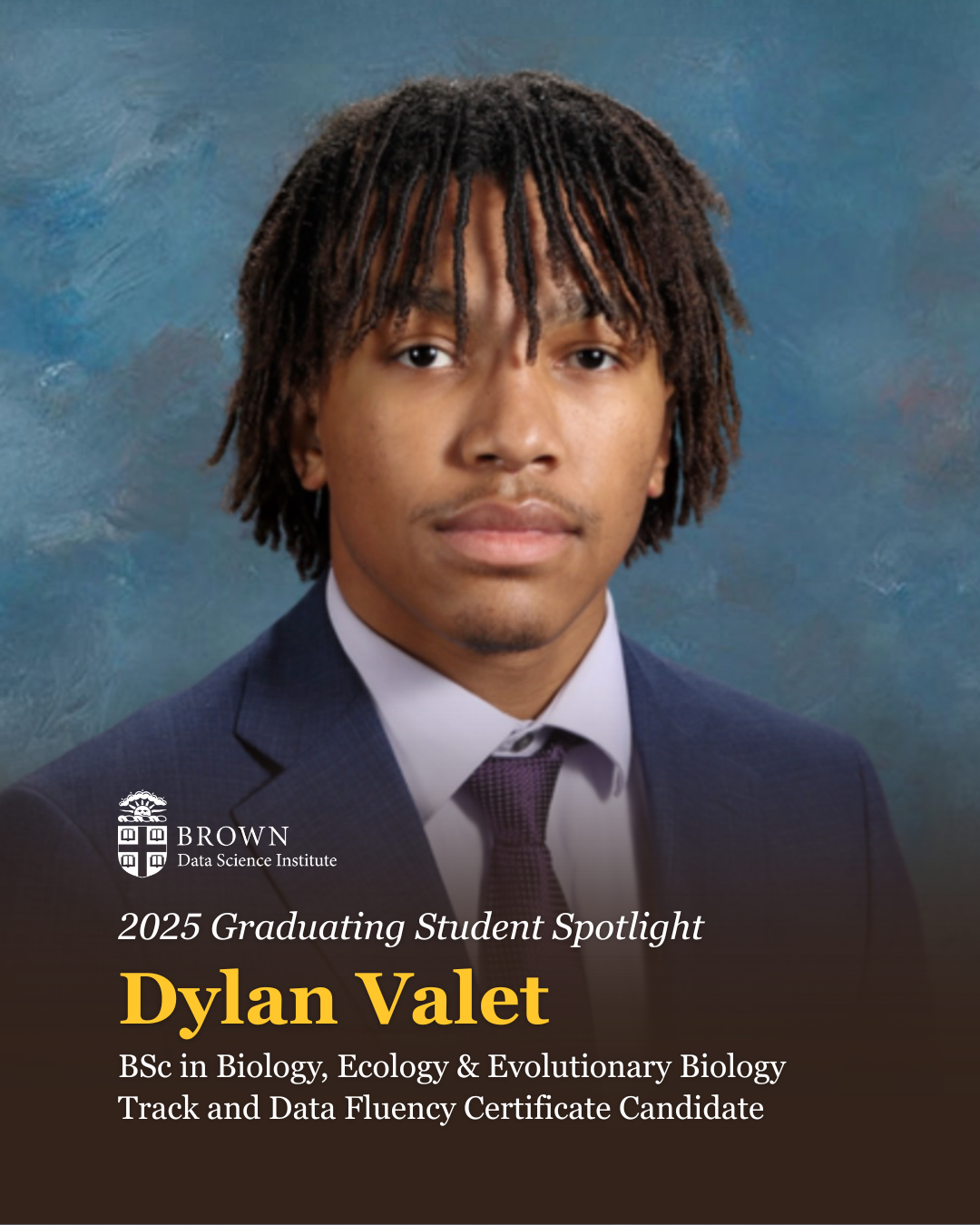 Fields of Interest
Fields of Interest
At Brown, my field of expertise and research focus has been conservation biology. More specifically, I’m interested in biological invasions, as well as species extinctions driven by climate change. Looking forward, I’ve become more broadly interested in protecting the environment, whether through research, policy, or strategic work that connects science with implementation and impact.
Why did you pursue the Data Fluency Certificate?
When I first came to Brown, I had no idea what data science was, and honestly, I had no interest in it. Through coursework in Biology, however, I began to develop a strong appreciation for how powerful data can be in solving problems and answering questions. After taking DATA 0200 to test out this interest, I was immediately drawn in by the material and decided to pursue the certificate.
What has been your favorite course at Brown?
My favorite course at Brown was DATA 0200: Data Science Fluency. It was my first real introduction to data science, and it opened up an entirely new approach to problem-solving and answering questions for me. The course gave me a strong foundation in tools and techniques that I refined and strengthened in coursework I took later on, but I was really surprised by how quickly I was able to apply what I had learned. Just one month after the semester ended, I was directly applying techniques from the course to a research project for my summer internship.
What research and internship experiences have shaped your time at Brown?
I’ve been fortunate to have gotten the opportunity to try a lot of different things here at Brown. Most recently, I just wrapped up working on a senior thesis to complete my Sc.B. in Ecology & Evolutionary Biology, working with Professor Dov Sax. The project involved the analysis of two large-scale vegetation survey databases to gain insight into the invasion risk of nonnative species of different biogeographic origins. I gained a lot of experience with data cleaning, statistical analysis, and visualization using Python. More importantly, I think the most valuable takeaway was learning how to contextualize my findings in the broader research landscape and using what is already known to paint the picture surrounding what we discovered.
This past summer, as an intern with the National Geographic Society, I worked on a research project in which I analyzed historical extreme weather data in order to identify global hotspots of vulnerability. This project helped me practice my independence and self-accountability, and was also the first opportunity I got to put to use what I learned in DATA 0200.
Earlier in my time at Brown, I interned at the Smithsonian Environmental Research Center, where I helped collect and analyze data for a large-scale reforestation study. This was my first engagement with ecological research, and I’m grateful it gave me the opportunity to understand how data is collected and interpreted in the world of academic research.
Taken together, I’d say these experiences helped me build a reasonably diverse set of skills. I think I’ve gotten a lot better at learning how to ask the right questions, analyze and interpret data, and communicate what I learned in a digestible way.
What has been your biggest challenge and your biggest accomplishment during your time in college?
My biggest challenge and accomplishment have both come from working on my thesis. It’s been the most demanding project I’ve ever worked on, involving months of data acquisition and cleaning, statistical analysis, interpretation, and writing. That being said, the most difficult things are also the most rewarding to complete. I think I’ve grown as an academic and as a person in a way that I had not expected going into it. I’ve become more independent, gotten better at communicating my ideas, and have learned to think more critically and thoughtfully before making decisions. Seeing it come together into an original piece of research has been incredibly fulfilling.
What advice would you give to incoming students?
During your time at Brown, there will be a lot of moments where the work seems too daunting or overwhelming. In my opinion, one of the worst feelings in the world is looking back and knowing you could have tried harder. If you gave it your best shot, that's something to be proud of, regardless of the outcome. Also, never be afraid to ask for help when you need it.
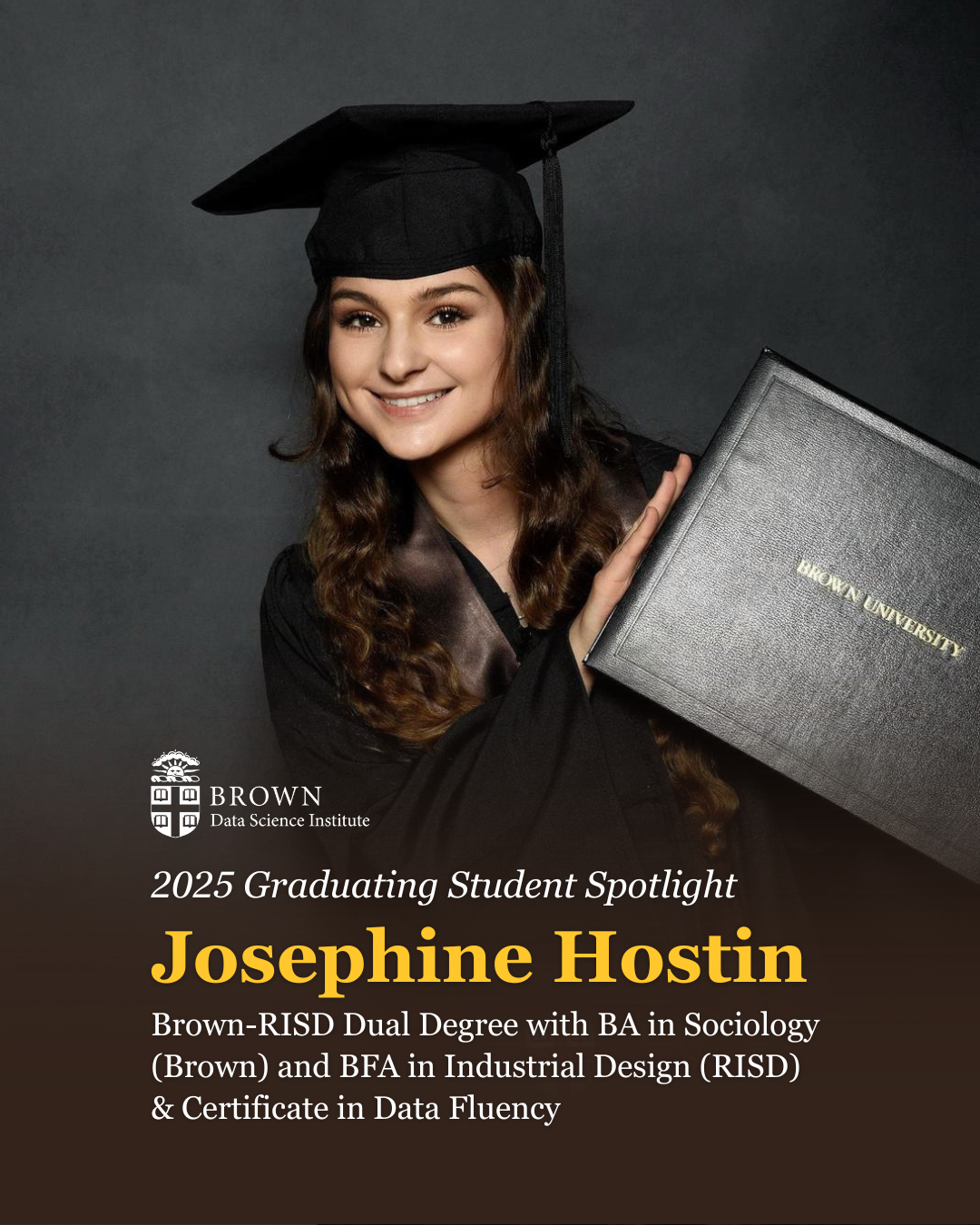 Fields of Interest
Fields of Interest
I've worked across a range of fields as a dual degree student, but if I had to define my focus, it's designing systems around human experience — particularly where technology, policy, and real-world needs don't align.
The core of my work focuses on the question: how do social, organizational, and technological systems shape people’s lives, and how can we design them to work better? I use sociology to map structures like workplaces, technologies, and communities; data to uncover patterns; and design and data science to build real-world tools that bridge the gap between good intentions and actual outcomes.
Whether it's addressing the hidden costs of eldercare, improving civic tech adoption, or streamlining enterprise marketing processes, my specialty lies in identifying the friction points others overlook and translating complex challenges into practical, human-centered solutions.
Why did you decide to pursue the Data Fluency Certificate?
While studying Industrial Design at RISD, I often felt frustrated that the creative process relied so heavily on intuition alone. It made me uncomfortable to defend my designs based purely on feelings, without hard evidence to prove I was making the right choices. I wanted something more concrete — the ability to run the numbers, clean the datasets, ask sharper questions, and uncover the hidden stories that lie beneath the surface. Pursuing the Data Fluency Certificate gave me the technical skills I needed — from regression modeling and SQL to data visualization — to transform my instincts into empirical evidence. I didn’t just want to trust my gut; I wanted to know I was right.
What was your favorite course at Brown?
My favorite DATA course was DATA 0200 — it fundamentally shaped the way I approach analysis. In one project, my team and I built a regression model and created visualizations to explore how the cost of assisted living (measured through the CPI for nursing homes and adult services) might influence hospitalization rates for seniors in the U.S. The experience changed how I see data: not just as a tool for answers, but as a way to ask smarter, more thoughtful questions about systems that are rarely linear or clean.
How have your academic interests changed over the course of your time at Brown?
When I first arrived at Brown, my focus was purely on creating beautiful products and designs that connected with people on a subconscious and emotional level. As time went on, my academic interests broadened to include business, startups, entrepreneurship, and data science. Now, as I approach graduation, I find that I’ve woven these interests together — moving beyond isolated design problems to understand the larger systems at play, using business strategies and market research as critical tools. I’ve realized that even the most beautiful design falls short if it doesn’t address the real barriers people face. Today, my work focuses on understanding who systems are built for — and how we can design them to serve people more thoughtfully and effectively.
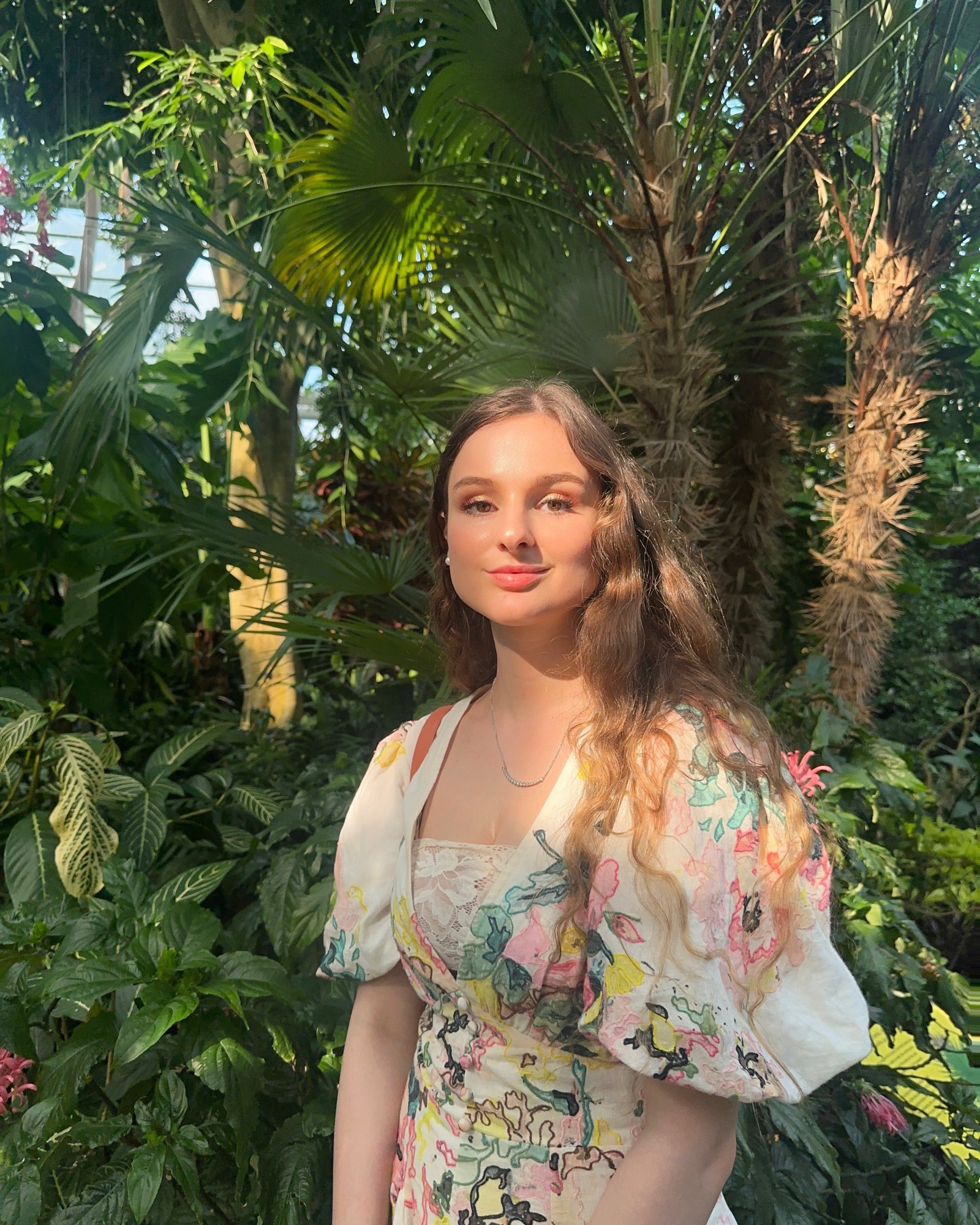
What has been your favorite part of being a student at Brown?
My favorite part of being a student at Brown has been the freedom to cross disciplines that typically stay separate. I could spend the morning studying Marx, Weber, and Durkheim, the afternoon sketching design prototypes and working in the metal shop, and the evening running regressions in Python. That freedom to move between fields and build my own logic across disciplines didn’t just add lines to my résumé — it gave me a true toolkit for thinking and creating.
What professional experiences have helped shape your academic interests during your time in college?
I’ve worked across healthcare UX (Lifespan), SaaS product marketing (Capitolis), civic tech research (Legislata), and consulting (NECG). In each role, I wasn’t just checking boxes — I was focused on translating messy, complex systems into something more human. I built regression models for eldercare cost analysis, cleaned healthcare research datasets, ran data-driven marketing funnel evaluations, and created engaging graphics and designs.
The common thread through all these experiences has been using my interdisciplinary education to identify what’s broken, applying data to prove it, and using design to start fixing it. That’s exactly the kind of work I want to continue doing — practical, cross-disciplinary, and always centered around people.
What has been your biggest challenge and biggest accomplishment during your time in college?
My biggest challenge was staying grounded while juggling the demands of a dual-degree studio workload, Brown’s rigorous class schedule, design projects, student clubs, and maintaining a personal life. Balancing everything at once was incredibly tough, and learning how to prioritize without burning out became one of my most important lessons. My biggest accomplishment is making it to graduation — and all the academic, emotional, and social growth that came with the journey.
Who has inspired you throughout your degree?
I’m deeply grateful to my capstone advisor, Professor Carrie Spearin, who pushed me to think bigger — encouraging me to move my sociology work beyond theory and focus on real-world impact, using it as a lens to understand the world around me. I’m also incredibly thankful to Junko Yamamoto, an architect at RISD, who mentored me through my BRDD capstone. Both have been extraordinary mentors whose passion and guidance have shaped not just my work, but the way I see the world.
What is next for you?
Next, I’m joining McMaster-Carr in their Management Development Program, where I’ll rotate through operational units and gain direct leadership experience managing real teams and business systems. Long-term, I hope to move into product management or consulting — building systems that not only scale but stay grounded in human realities. I want to design structures that actually work for the people who are too often overlooked. Outside of work, I’m excited to get back into fine art and set up a studio space in my new home.
What advice would you give to incoming students?
Learn to finish things — especially after they stop feeling shiny and exciting. That’s when it really counts.
Also, don’t let yourself get siloed. The best solutions — the ones that truly work — often come from connecting fields, skills, and ways of thinking that don’t seem like they belong together at first. And most importantly, enjoy your time at Brown. Soak in every minute of it and make the most of every opportunity.
.png) Fields of Interest
Fields of Interest
(Equitable) urban sustainability work. Transition/energy justice, nature based solutions.
Why did you decide to pursue the Data Fluency Certificate?
I began to realize the rising value, demand, and necessity for data fluency skills in society and the utility of these skills for environmental work such as through GIS, climate modeling, risk assessment, etc.
What has been your favorite part of being a student at Brown?
I really enjoyed the privilege of being able to customize my courses, determine my schedule (to a degree), and create a mixture of classes that I would take. I tried to have a balance of stem, humanities, requirements, and a non-requirement/fun or interesting class each semester. It’s a recipe that worked well for me so I stuck to it. Something else that stood out in my experience was the ways in which professors and students challenged me to think critically and creatively and to dig deep into my passions.
What has been your biggest challenge during your time in college?
My biggest challenges at Brown were mostly mental and emotional hurdles, such as homesickness, lack of motivation, and impostor syndrome. Being far from home and not seeing family gradually took a toll on me, and at times I felt lost in my journey, unsure of my future and the significance of my academic obligations. I also had times where I put myself down by comparing myself to others. I was able to persevere by leaning into my relationships both on campus and at home, as well as practicing my faith and getting closer to God.
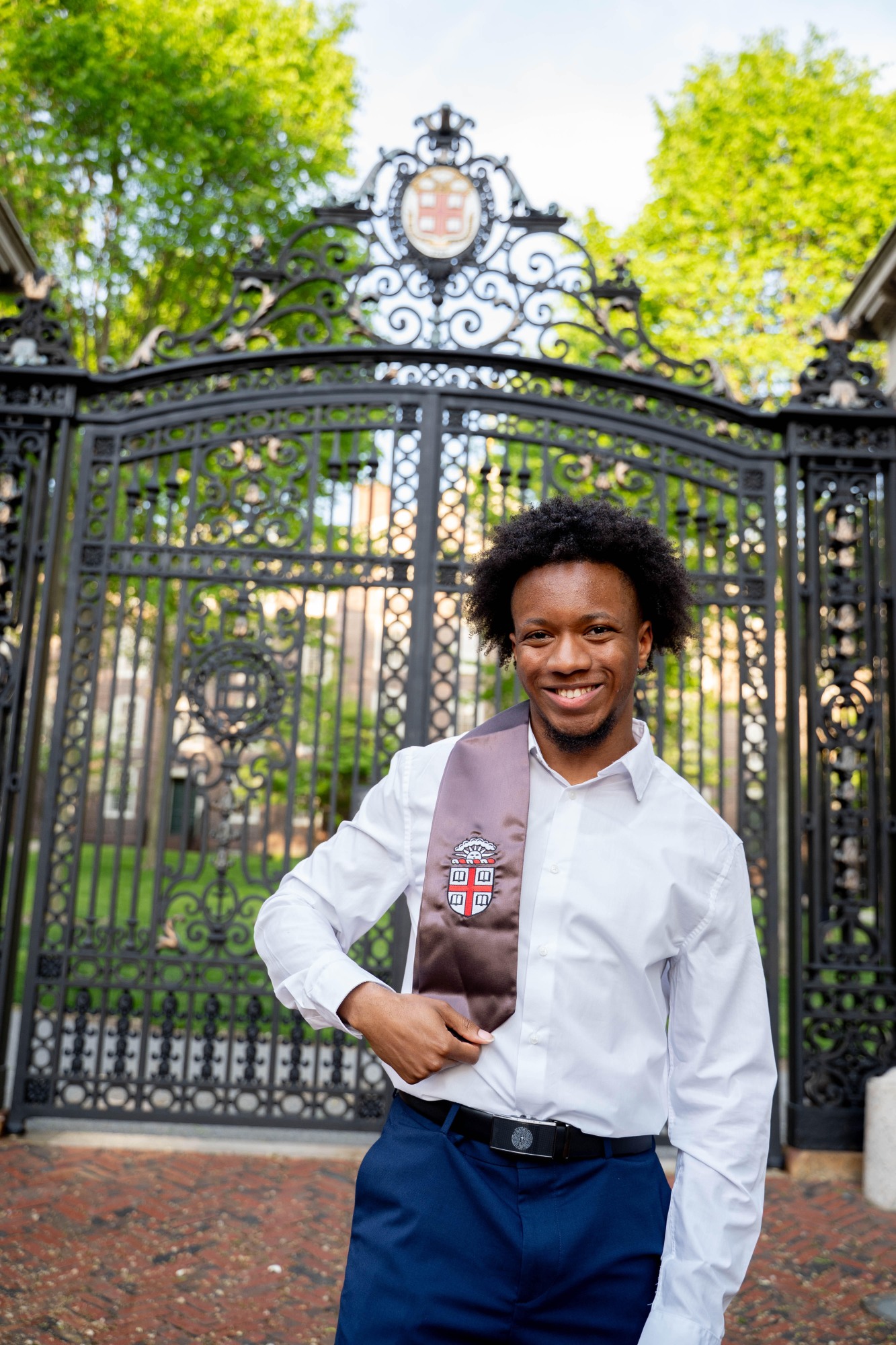 What has been your biggest accomplishment?
What has been your biggest accomplishment?
My greatest accomplishment was probably finishing my capstone project. Not only is this essentially my biggest requirement and the culmination of all of the work I’ve put in towards my degree, but I’ve never dedicated more time at Brown to a single project, which was only possible because it was something that I was very interested in, so the entire research process was enjoyable, and it provided me with something tangible to show for my hard work and dedication.
What academic and extracurricular experiences have shaped your time at Brown?
Some of my standout experiences include being a staff writer for the Black Star Journal (BSJ), student leader for Black Christian Ministries (BCM), offshore wind research, and my summer internship with the Nature Conservancy.
As a staff writer for BSJ, I’ve written pieces in a variety of genres, from poetry to narrative to persuasive pieces, on a variety of topics including mental slavery, the intersections of music, pop culture, mental health, and Christianity, and climate justice. This outlet has been a great way for me to sharpen my writing skills and share writing with others on campus.
At BCM I’ve been a student leader for a year now, helping lead and facilitate weekly bible studies as well as informal events, and this has helped me stay grounded in my faith throughout college.
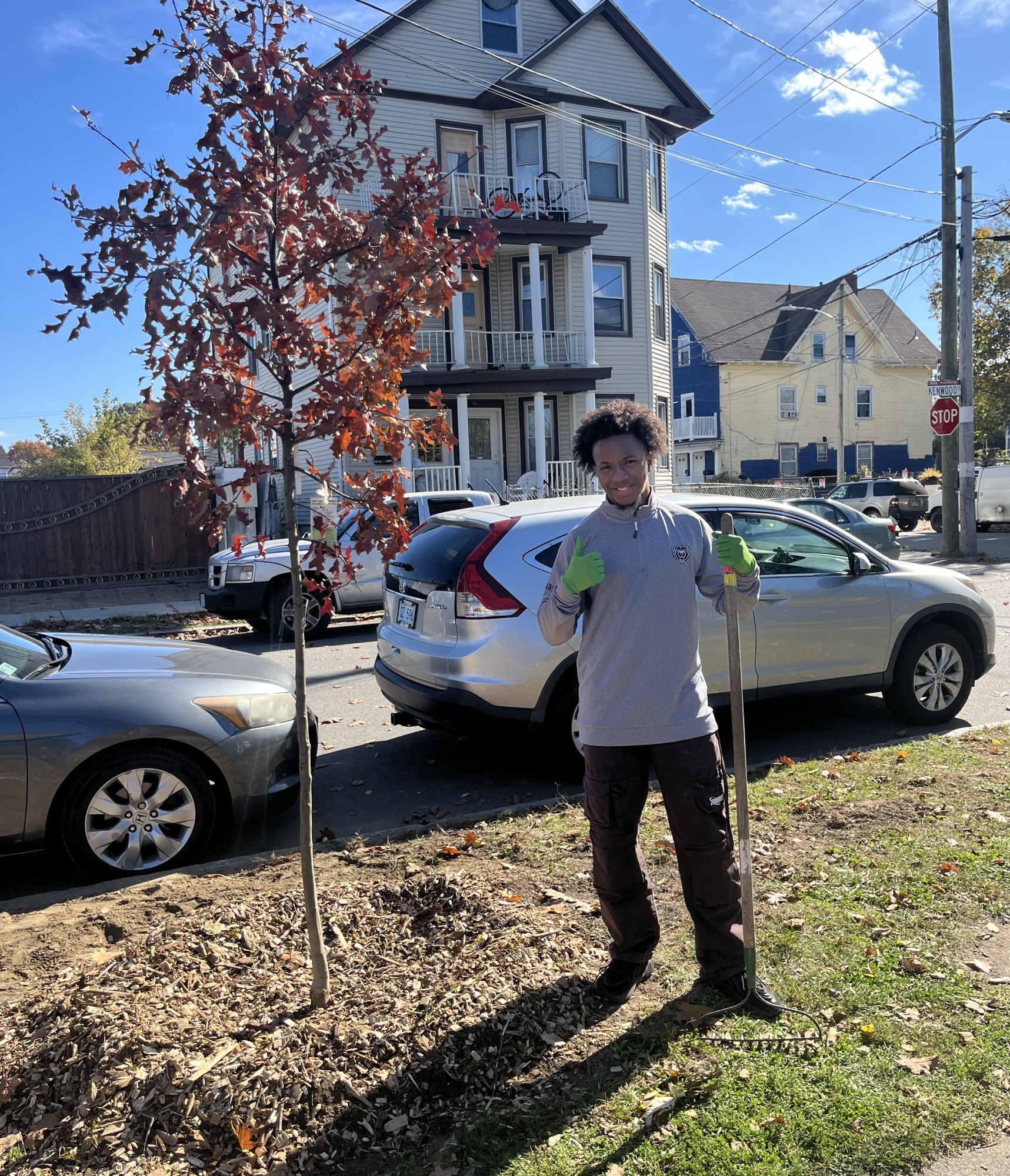 During my sophomore year I took ENVS 0110, an engaged scholarship course that paired me with a local nonprofit called Roots2Empower that does work for low-income and incarcerated individuals. My group and I ended up doing research on offshore wind for this organization, and my focus was on the impact that offshore wind would have on fossil fuel workers and unemployed persons in Rhode Island. This was an informative experience that deepened my understanding of what makes a just transition truly just.
During my sophomore year I took ENVS 0110, an engaged scholarship course that paired me with a local nonprofit called Roots2Empower that does work for low-income and incarcerated individuals. My group and I ended up doing research on offshore wind for this organization, and my focus was on the impact that offshore wind would have on fossil fuel workers and unemployed persons in Rhode Island. This was an informative experience that deepened my understanding of what makes a just transition truly just.
Lastly, I did a summer internship with the Nature Conservancy where I conducted research on state-level climate justice policy to produce a report on what an ideal policy package for the state of Rhode Island should consist of based on local needs, previous policy actions, and policies implemented in other states. I also worked on a data project in which I cleaned and aggregated tree planting data for the Providence Neighborhood Planting Program. I learned a lot from this internship experience about climate justice policy and equitable tree planting that I hope to carry on with me into my professional work after Brown.
What advice would you give to incoming and current students?
I would encourage them to explore the campus and everything it has to offer as far as clubs, classes, events, and people. Then, once you find the things you’re interested in, people you vibe with, and spaces that help you learn, grow, and feel at home, you should commit yourself to them. Don’t force yourself into any of these things, but when you do find them it will take an effort on your end to maintain them. Think of your brown experience like a garden; you get to choose what you plant in your garden, but you will also have to water everything and the more you put into them the more they will grow. Seize opportunities, feed your curiosity, and constantly remember the privilege that comes with attending this institution. And make sure to have fun!
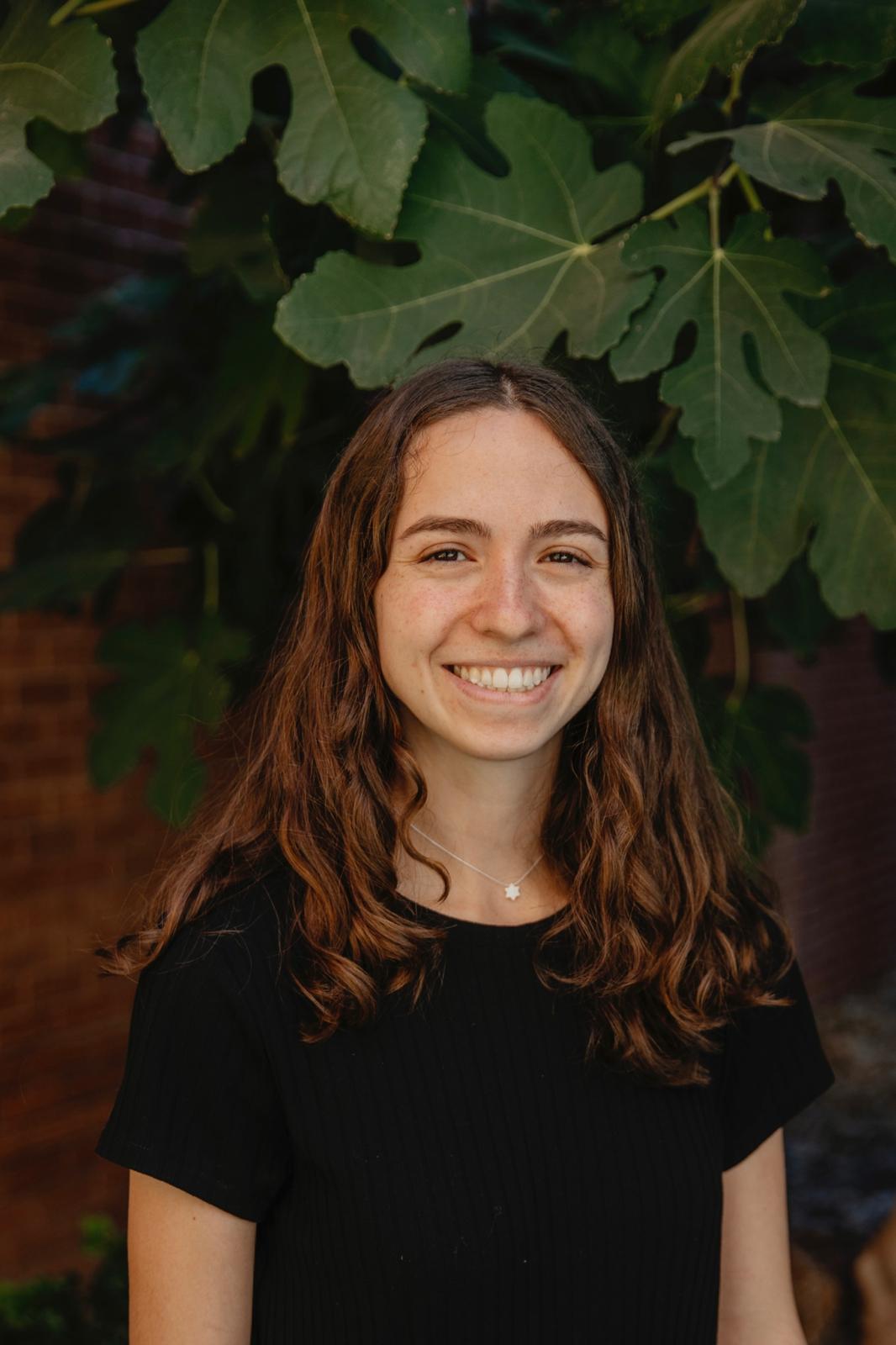 Field of Interest
Field of Interest
Plant biology! I have always loved spending time in nature and learning about plants, and throughout my time at Brown I've been able to dive into that interest through various courses and research opportunities. I also love learning about evolution and will talk about it with anyone who will listen.
How have your academic interests changed over the course of your time at Brown?
I came to Brown thinking that I would be a literary arts or environmental studies concentrator. I then realized that my passion for the environment is tied to biology and my love of nature, so I shifted to biology and have sought out classes and research that focus on conservation, preserving biological diversity, or using nature to try to mitigate the climate crisis. I also utilized the freedom of the Open Curriculum to take literary arts and comparative literature classes to fulfill my interest in creative writing.
What drew you to pursue the Data Fluency Certificate?
After taking CS111 in my freshman spring, I realized that data fluency is extremely important in biological research and developing fluency through the program would be a big asset in my career. I enjoyed CS111, but didn't think that continuing with the computer science sequence would be right for me, so the certificate was a good middle ground.
What has been your favorite course at Brown?
Diversity of Life is one of my favorite courses at Brown. I took it in the fall of my first year and liked it so much that I went on to TA for the course every year since then.
What kinds of research experiences have made an impact on your time at Brown?
I've spent the past three summers at three different universities doing plant science research with the help of the SPRINT and CHAI fellowships and the NSF REU program. During my freshman summer, I studied sunflowers and how they can be used to clean up sites contaminated with heavy metals. My sophomore summer, I studied how nitrogen and water interact in different plants and used photosynthetic capability as a measure of plant health. Last summer, I studied the impact of two genes on vascular differentiation in tomatoes to better understand plant grafting.
My first biology research course, my sophomore spring, was the first of many tomato research projects I've participated in, and has tied in nicely to my thesis. That course also gave me a lot of wet lab skills that I've continued to use and master over the years. This year, I've been working on my thesis looking at tomato grafting from multiple perspectives and it has been very exciting, challenging, and gratifying to work on this research independently.
I also did a project that made up the experiential component for my Data Fluency Certificate: examining people's perceptions of the health impacts of GMOs. I was able to walk through the entire process of social science research from writing an IRB proposal to deriving conclusions from my survey transcripts and putting them into context with my literature review.
Throughout all my research experiences, I've learned a lot more about the research process and connected with really great mentors.
Outside of the classroom or the lab, what has shaped your time at Brown?
One of my main extracurriculars is Gift of Life which is an organization that recruits people for the bone marrow registry. I have recruited over 200 students to join the registry and in the process of stopping busy students and asking them if they are interested in joining the registry, I've received a lot of nos. This experience has made me a lot more comfortable with walking up to strangers and starting a conversation and with facing rejection, an unavoidable part of life.
I've also run a few fun events over the years related to breast cancer and childhood cancer awareness.
My sophomore year and this year, I ran a Pink Shabbat where everyone showing up to Shabbat dinner was encouraged to wear pink, the menu was all pink, and there were speeches and resources about the importance of breast cancer awareness within the Jewish community. The best part of planning the event was designing giveaway stickers that capitalized on current campus trends (my sophomore year the sticker was a pink Blueno and this year it was a pink Birb). The other related events I ran were two hair donation drives last year. Across the two events, I managed to convince over fifteen people to let their friends cut off 8 or more inches of their hair to be made into wigs for children facing hair loss. At both events, someone decided to shave their head!
Who has inspired you throughout your degree? Is there anyone in particular that you’d like to thank, or advisors that you have had a particularly good relationship with?
I would like to thank Professor Mark Johnson who has been an incredible professor and thesis advisor. He gave me the encouragement I needed to pursue my thesis, even while I wasn't following the standard timeline. His office hours were extremely helpful for his genetics and plant biology courses, and he also has helped me overcome the inevitable hiccups of research.
My siblings have been super supportive throughout my degree. They were always available, even very late at night, to give another pair of eyes to an essay. My sister always gave advice regarding course registration (especially freshman year when I couldn't register for a single course that I intended to take). My brother was always a phone call away for coding or math explanations. They also both served as inspirations for how to work hard while successfully making room for fun.
What has been your favorite part of being a student at Brown?
Without a doubt, the best part about being a student at Brown is the culture and community on campus. Everyone is dedicated to their studies, but that doesn't stop anyone from being extremely kind and friendly, and always up for a last minute adventure. There's an amazing balance between the academic seriousness and taking advantage of the once-in-a-lifetime opportunity of spending four years as a Brown University undergraduate.
What advice would you give to incoming students?
I would encourage all students to take advantage of as many of the amazing opportunities on campus as they are interested in, but also to remember that they don't need to prove themselves to anyone. They should try to be as self-motivated as possible to get the most out of their time at Brown.
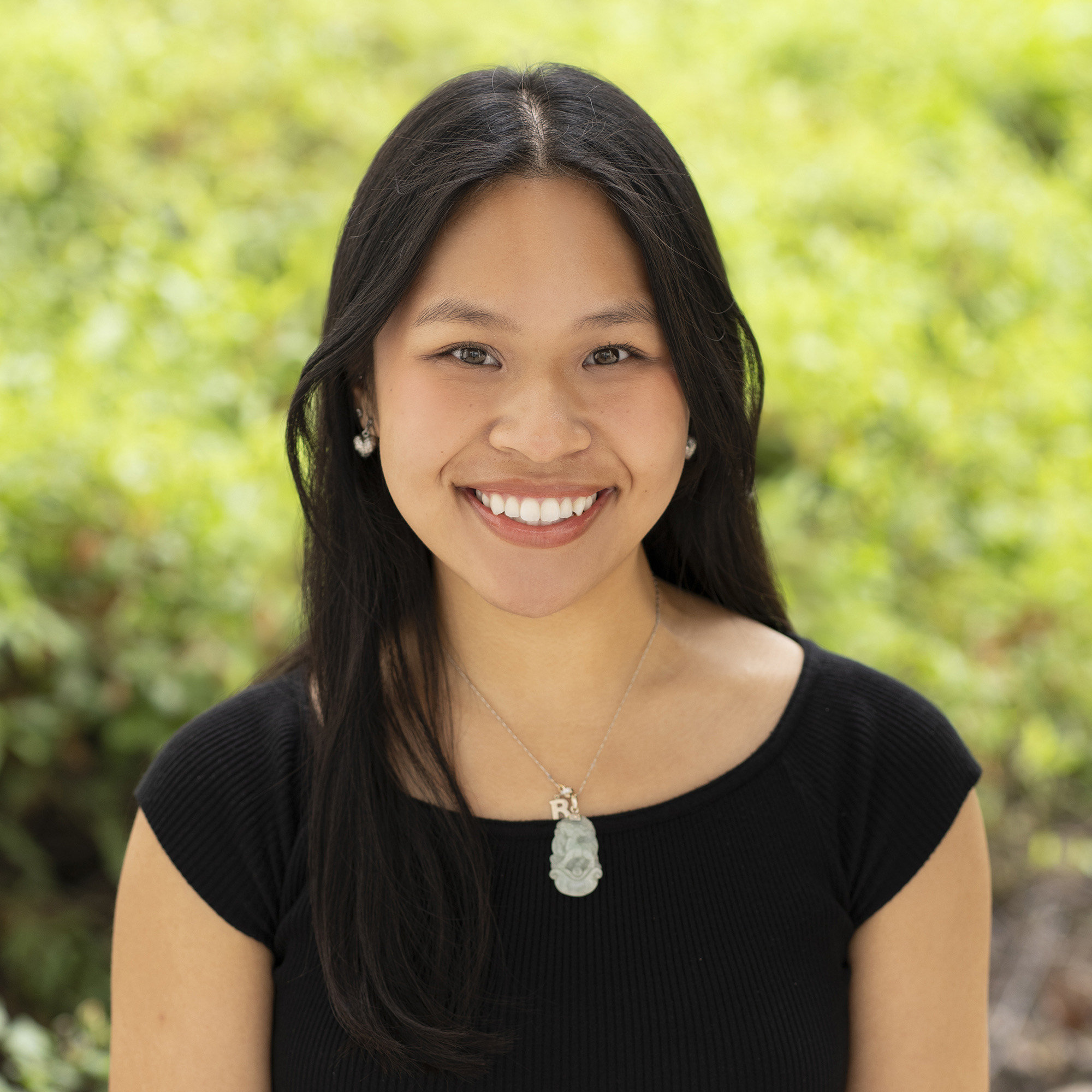 Fields of Interest
Fields of Interest
I’m most interested in health equity, access, and challenging one-size-fits-all models of healthcare through digitalization.
Why did you pursue the Data Fluency Certificate?
The Data Fluency Certificate seemed like such a perfect opportunity to improve my hard skills in data science and analysis while focusing my interest still within the domains of biology and public health. The certificate also gave really great opportunities to apply our class knowledge to the real world, and I loved taking advantage of these experiential opportunities.
What has been your favorite course at Brown?
My favorite course at Brown has been BIOL 0940D Rhode Island Flora and Fauna: Understanding and Documenting Local Plant Diversity. In this class, we went on field trips to local coastal wetlands and uplands, freshwater wetlands, peatlands, upland forests, and disturbed areas—from there we collected plants and preserved them in lab, learned how to identify organisms based on their taxidermy, and developed intimate relationships with the natural landscape of Providence.
How have your academic interests changed over the course of your time at Brown?
My interests have only been augmented as I’ve been at Brown, especially when it comes to understanding how data intersects with health ethics and inequity that arises as a result. Furthermore, getting to explore more areas in anthropology, archaeology, and creative nonfiction have become integral pillars to my interdisciplinary learning in really surprising ways.
What research and extracurricular activities have shaped your experience at Brown?
I’ve been really lucky to have a multitude of experiences at Brown from being an Editor-in-Chief for VISIONS Magazine (Brown-RISD’s only AAPI literary and visual arts publication) to being a Minority Peer Counselor Co-Coordinator at the BCSC for two years. I’ve also had really awesome internship experiences doing clinical research work at Edwards Lifesciences and Intus Care, a Brown-student start-up that is doing amazing things now!
What has been your biggest challenge and your biggest accomplishment during your time in college?
I believe my biggest challenge since coming to college has actually been acclimating myself to the struggles that come with going to school so far away from home, since I’m from California, and dealing with things like homesickness, moving by myself, and not being able to see my family regularly. My biggest accomplishment was probably being recognized at the 2024 State of Rhode Island Asian American and Pacific Islander Heritage Month Celebration.
Who has mentored you throughout your degree?
Jennifer Pellowski was my professor for PHP 0700 and I also TA-ed her class—but she really instilled in me a clear vision of what a passion for global health surmounts to and her care for what she does is something I want to emulate. Additionally, Dr. Neil Sarkar and Dr. Therese Zink have been incredibly supportive in the process of writing my thesis, and they’ve definitely nuanced, complicated, and improved my work.
What has been your favorite part of being a student at Brown?
Being a student at Brown is such a special experience because everybody has such a deep passion for what they are studying and holds a personal stake in the fields that they seek to enter. I love how learning is authentic and that my curiosity is constantly being inspired by the communities I’ve been privileged to enter here.
What advice would you give to incoming students?
It becomes so easy to get swept up in our tasks, responsibilities, and everything else that comes with being a college student. Don’t let the speed of life overwhelm you—remember to take the scenic path, make calls instead of text, and enjoy the sun as much as you can.
Fields of Interest
I am most interested in nonfiction writing and teaching / education.
Why did you decide to pursue the Data Fluency Certificate?
I wanted to get some background in working with data as it becomes more relevant in our society. I also think it’s been helpful for me to think about the interpersonal work of writing or teaching with how it may connect with data, and how I can balance these different considerations.
What have been your favorite courses at Brown?
So many! I specifically loved my first-year seminar, Christmas in America, City Politics, and Introduction to Creative Nonfiction, among many other great courses.
How have your academic interests changed over the course of your time at Brown?
My first year at Brown, I took courses in eight different departments, and had no idea what I wanted to study. Luckily, the Open Curriculum allowed this type of exploration, and I’ve been able to learn across so many different fields in my time at Brown. Although I chose to concentrate in English, I have loved getting to supplement my English work with courses in Religious Studies or Visual Arts or through the DSI. Brown has given me the space to consider the intersection of so many disciplines, and I have loved getting to explore these new interests.
What has been your favorite part of being a student at Brown?
There are many amazing things about Brown, but one of the most special parts I’ve found is the level of curiosity among the student body. Everyone is so passionate about their work and it is awesome to see and hear about my friends’ many different interests. It is such an exciting community of people!
What research and extracurricular experiences have shaped your time at Brown?
Through SPRINT and UTRA, I have been lucky to experience some exciting research and internship opportunities, such as working on communications and research with Around the World in 80 Fabrics, an organization committed to environmental and sustainable fashion initiatives, and organizing publicity for the Nonfiction@Brown lecture series, which brings in current authors and writers in the nonfiction field. This year, I also worked soon an honors thesis through the English Nonfiction department, where I focused on children and teen experiences of the Los Angeles wildfires in January. I have also been involved in post- magazine and Brown Outdoor Leadership Training (BOLT), as well as some other fun clubs around campus. I have loved getting the experiences of working with people, sharing their stories through different media and platforms, and am excited to continue applying this in my future!
What has been your biggest challenge and accomplishment?
Working on my thesis definitely had a lot of ups and downs, but ultimately was one of the most rewarding experiences of my time at Brown. It was hard to produce such a big project from beginning to end, but I learned so much about the writing and research process, had so many amazing conversations through my interviews, and got to see what it was like to finish such a big project. I am so grateful for the opportunity and am excited to keep doing work like it!
Who has inspired or mentored you throughout your degree?
I feel very grateful to all my professors and friends for all of their support along the way. I am particularly grateful to Professors Grace Talusan and Jonathan Readey for being my incredible thesis advisors and guiding me toward the finish line!
What advice would you give to incoming students?
Embrace the Open Curriculum and allow yourself to explore as much as possible, and be creative along the way. There is no rush to figure things out or know exactly what you want to do — take the time to try new things and have a lot of fun.
DSI Senior Awards Recipients
Anna Lapre has been an integral part of the undergraduate data science community at Brown during her time here. She recently received the inaugural DSI Senior Award for Academic Achievement, recognizing her impressive honors thesis, valuable leadership within the DSI Departmental Undergraduate Group (DUG) (which she founded), and her contributions as a TA for several DATA courses. After graduation, Anna will be heading to San Francisco to pursue her passion for climate action as a software engineer.
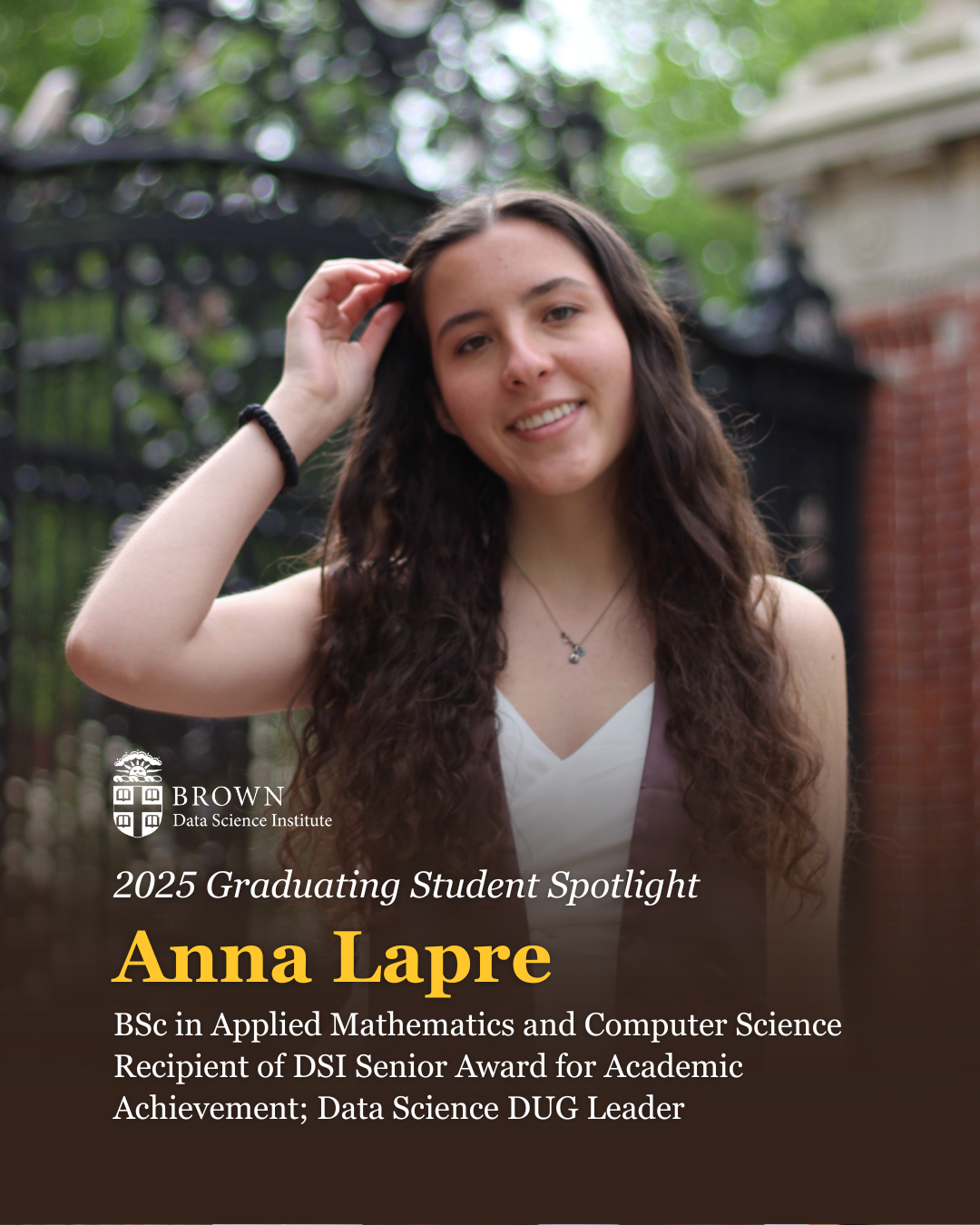 Fields of Interest
Fields of Interest
I’m super excited by the intersection of technology and climate action. I’ve been passionate about tackling climate change for many years but being a student at Brown has shown me the ways that computer science, math, and engineering can be a huge part of the solution to the climate crisis. This culminated in my senior thesis in which I used deep learning to analyze the carbon capture abilities of crystal structures called Metal Organic Frameworks!
How have your academic interests changed over the course of your time at Brown?
I always knew I wanted to study applied math in some form, but it wasn’t until a few semesters in that I realized I wanted to pair applied math with computer science. I dabbled in chemistry, economics, and pure math, all of which I’m grateful to have gained experience and context in different fields that led to opportunities I wouldn’t have had otherwise.
What has been your favorite part of being a student at Brown?
It’s so hard to pick a favorite! I’ve loved it all: the amazing and supportive faculty, the interest of the student body in tackling big issues, the collective curiosity of everyone on campus - all of the above!
Outside of academics and the lab, what experiences or activities have shaped your time at Brown?
While at Brown I’ve been a part of the Data Science DUG leadership team, Brown Bouncing Bears (jump rope club on campus!), and various advising groups (meiklejohn, WISE!)! I’ve also had the opportunity to spend each summer during my time at Brown in a different city: Boston, Stockholm (Sweden!), and D.C. Each of these offered such a fun way to get to know students across different years at Brown and beyond and have truly enriched my time as a student.
Who has inspired or mentored you throughout your degree?
There are so many people to thank! My thesis advisor Professor Karianne Bergen, Professor Linda Clark who helped get the DS DUG off the ground, Professor John Friedman with whom I’ve TA’d and done research, the staff at DSI who have been so helpful in all of our DUG endeavors - the list goes on and on!
What is next for you?
I will be heading to San Francisco, CA where I’ll be pursuing my passion for climate action as a software engineer at Watershed, the climate-tech startup which helps companies track, report, and reduce their carbon emissions!
What advice would you give to incoming students?
Dive in!! Brown offers so many wonderful opportunities and you’ll be surrounded by such amazing people. Enjoy your time here and try to get involved wherever your passions lie - you really can’t go wrong :)
Catie Manning is a Data Fluency Certificate student who has concentrated in History during her time at Brown. She has learned how to incorporate data science and her technical skills into her work with history, social science, and public policy. Catie recently received the inaugural DSI Senior Award for Public Service in Data Science, recognizing her interdisciplinary focus, significant involvement with the Data Science Institute through the Data Fellows program, and her strong academic abilities as a Teaching Assistant.
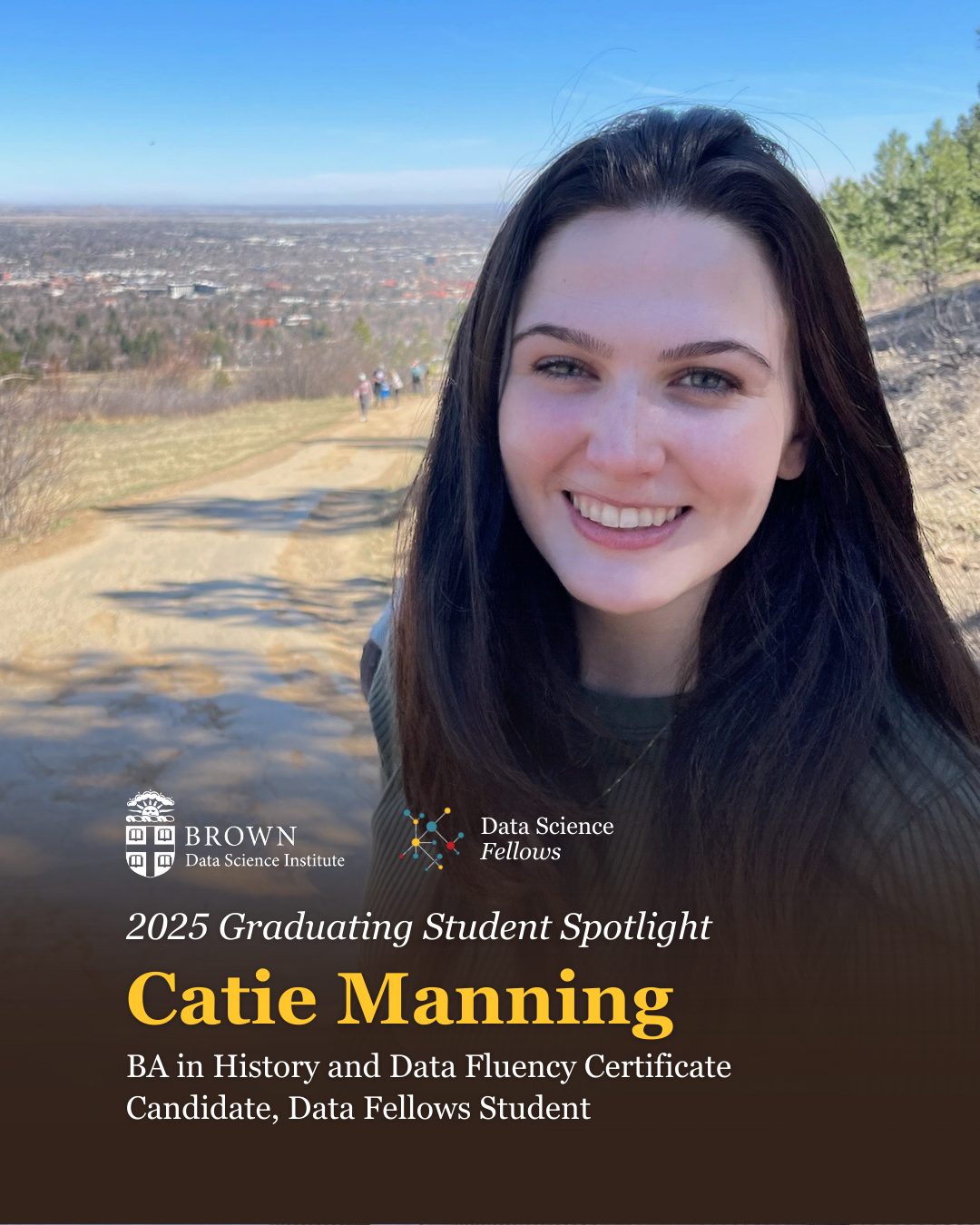
What has been your favorite course at Brown?
From my history courses: World of Byzantium, from data science: Data Visualization and Narrative
How have your academic interests changed over the course of your time at Brown?
I think the Data Fluency Certificate played a huge role in changing my academic interests at Brown. I came into Brown really having no confidence in my STEM skills - I was convinced I was a pure humanities student. The certificate really helped me not only build up my practical computer skills, but also to see how STEM and the humanities can interact. I realized that data and coding is more about problem-solving and creative thinking than memorizing syntax, and those skills are really what I love best in the humanities as well.
Why did you decide to pursue the Data Fluency Certificate?
I stumbled across the certificate almost by accident, but I am so glad I did! I took DATA0080: Data, Ethics, and Society purely out of interest, and from there, learned about the certificate. Before I took DATA0080, I felt like I was hearing so many data-related terms thrown around with no real knowledge. I saw headlines weekly that we were “living in the age of big-data” and I wanted to actually find out what that meant and how that applied to me and my education!
What academic and research experiences have shaped your time at Brown?
Learning data science has really opened up so many opportunities for me at Brown. In addition to serving as a TA for DATA0080 and DATA0200, I have had two amazing data-based research positions at Brown. Last summer, I served as an Undergraduate Research Fellow for Social Science and Public Policy. I worked with a team of students on a historical economics project under Professor Anna Aizer - examining the effect of New Deal policies on wealth in the American South. This was a lot of true data work - really getting into the individual cells of very long tables! I really learned the value of teamwork in research through this project and sharpened many of the skills I learned through the certificate.
Last fall semester, I worked with Professor Ahsan Ashraf on redesigning the project management structure and curriculum for his master’s practicum course. I learned so much more about the data science pipeline and the more practical operations and communications side of the field. This was a project for the Data Fellows program at Brown - being a part of this cohort and seeing everyone else’s projects develop was an especially rewarding part of this experience.
.jpg) What has been your biggest accomplishment during your time in college?
What has been your biggest accomplishment during your time in college?
One of my favorite accomplishments at Brown was the work I completed with Professor Damien Mahiet and fellow student Kate Hardy on Andrews House. Last year, Andrews House was renovated and turned into the new hub for the Cogut Institute for the Humanities. Before it re-opened its doors, our goal was to research the history of the building and all of the ways it served the Brown community before its new role for the Cogut. Kate and I got to examine century-old documents and blue prints in the John Hay library, and even helped produce a Wikipedia page about one of the previous inhabitants, Alfred Coats. It was such an incredible history-in-action experience for two history students, and it was so fun to attend the opening of the new Andrews House and see the history we learned about all around us!
Who has inspired and mentored you throughout your degree?
I would really like to thank Dr. Linda Clark. I know I am one of many many students that can say she absolutely transformed my Brown education. She has always encouraged me to reach for every opportunity available and has been endlessly supportive throughout all of my experiences at Brown - data science related or not. She really has a passion for making sure that anyone who wants to learn data science can. Dr. Clark has been instrumental in making me believe in myself as a data science student. I cannot thank her enough for adding a whole new dimension to my time at Brown.
What has been your favorite part of being a student at Brown?
My favorite part of Brown has definitely been my work with the Brown Opinion Project. I have been in the club since I was a freshman and have been Co-President for the past two years. We run campus-wide polls to understand what students really think about anything from campus policies to pop culture. It has been a joy to not only work with such a talented team, but to put data analysis skills into action to uncover some really cool findings about our campus.
What is next for you? Starting this summer I will be working as a paralegal in Boston!
What advice would you give to incoming students?
As a Meiklejohn Peer Advisor, I always encourage students to explore, explore, explore. That can mean anything from showing up to a class one time during shopping period to taking four semesters of a new language just for fun. As fast as time flies at Brown, you have much more time than you think. In addition, put yourself out there - apply to every internship, job, or club you are interested in and see what happens. You might surprise yourself!
In addition: do the Data Fluency Certificate ! :)
Michelle L. Ding is a graduating senior in Computer Science who has worked closely with DSI and the CNTR during her time at Brown, and she’s not done with us yet. After finding her niche in AI governance and socio-technical computing through research projects, clubs, and internships while at Brown–notably founding and leading the CNTR’s Socially Responsible Computing Handbook project–Michelle will be returning this fall as a student in the CNTR’s PhD program. Michelle recently received the inagural DSI Senior Award for Public Service in Data Science, recognizing her tireless work and leadership on the Socially Responsible Computing Handbook.
.png) Fields of Interest
Fields of Interest
AI governance, socio-technical computing, and participatory design
How has your time at Brown shaped your academic and personal interests?
In my first year at Brown, I was heavily involved in community organizing, policy, and advocacy around sexual violence prevention and reproductive justice. I worked as a policy coordinator in the student-run organization End Sexual Violence @ Brown and a Sexual Assault Peer Educator with Brown Wellness to improve the culture of consent on campus. I also worked with the Rhode Island Coalition Against Domestic Violence (RICADV) to advocate and lobby for the Address Confidentiality Program, now signed into law, which protects the privacy of domestic violence survivors. Post-Dobbs, I co-founded Students at Brown for Reproductive Justice, a coalition with over 40 Brown student organizations, to launch a mutual aid campaign that raised over $3000 for the Women's Health & Education Fund of Rhode Island, Indigenous Women Rising, and Sister Song, organizations providing reproductive care for disproportionately affected communities across the country. (P.S. Here are some resources I compiled on sexual/reproductive health in the Brown/Providence area!)
When I entered the Computer Science space, I wanted to find an intersection between the community organizing work I loved and the new technical skills I was developing. I spent a summer in DC as a Brown in Washington fellow working on responsible AI at the American Association for the Advancement of Science. After that, I founded the Socially Responsible Computing Handbook project with professors Suresh Venkatasubramanian and Julia Netter. This year-long project is a perfect example of the kind of interdisciplinary, collaborative, community-centered, and impact-driven work that I care about. I also recently wrote a paper on AI-generated non-consensual intimate images–which draws upon my early experiences in sexual violence prevention–that was accepted in the CHI 2025 Sociotechnical AI Governance workshop.
What has been your favorite part of being a student at Brown?
There are pianos everywhere for spontaneous jam sessions!
Who has inspired or mentored you throughout your degree?
There have been so many incredible professors who supported me throughout my Brown journey. In particular, I would like to thank Suresh Venkatasubramanian and Julia Netter for entertaining my SRC handbook thought-experiment-turned-legit-project and for their endless support, wisdom, trust, and faith. I’d like to thank Tim Nelson for creating the best teaching assistant environment in CS32 Software Engineering, always uplifting socially responsible computing, and for supporting me in my grad school applications. I’d like to thank Harini Suresh for her kind and thoughtful advising (and office tea) and for co-authoring with/guiding me to my first CHI workshop paper. Finally, I’d like to thank Malika Saada Saar for her immense advising and support for both my professional and personal growth in the Human Rights and AI study group and in our upcoming piece for the Oxford Handbook of Human Security. I am so eternally grateful for all the fantastic faculty I have been lucky enough to meet at Brown! Truly, they believed in me when I struggled to believe in myself and helped me get to where I am today.
What is next for you?
I’m extremely excited to be starting a Ph.D. in Computer Science at Brown with advisors Suresh Venkatasubramanian and Harini Suresh. I enter the program knowing that, here, I will be given the best support, resources, freedom, and trust to fully explore my interests, push my limits, and develop research that serves the communities I care about most.
Master's in Data Science Students
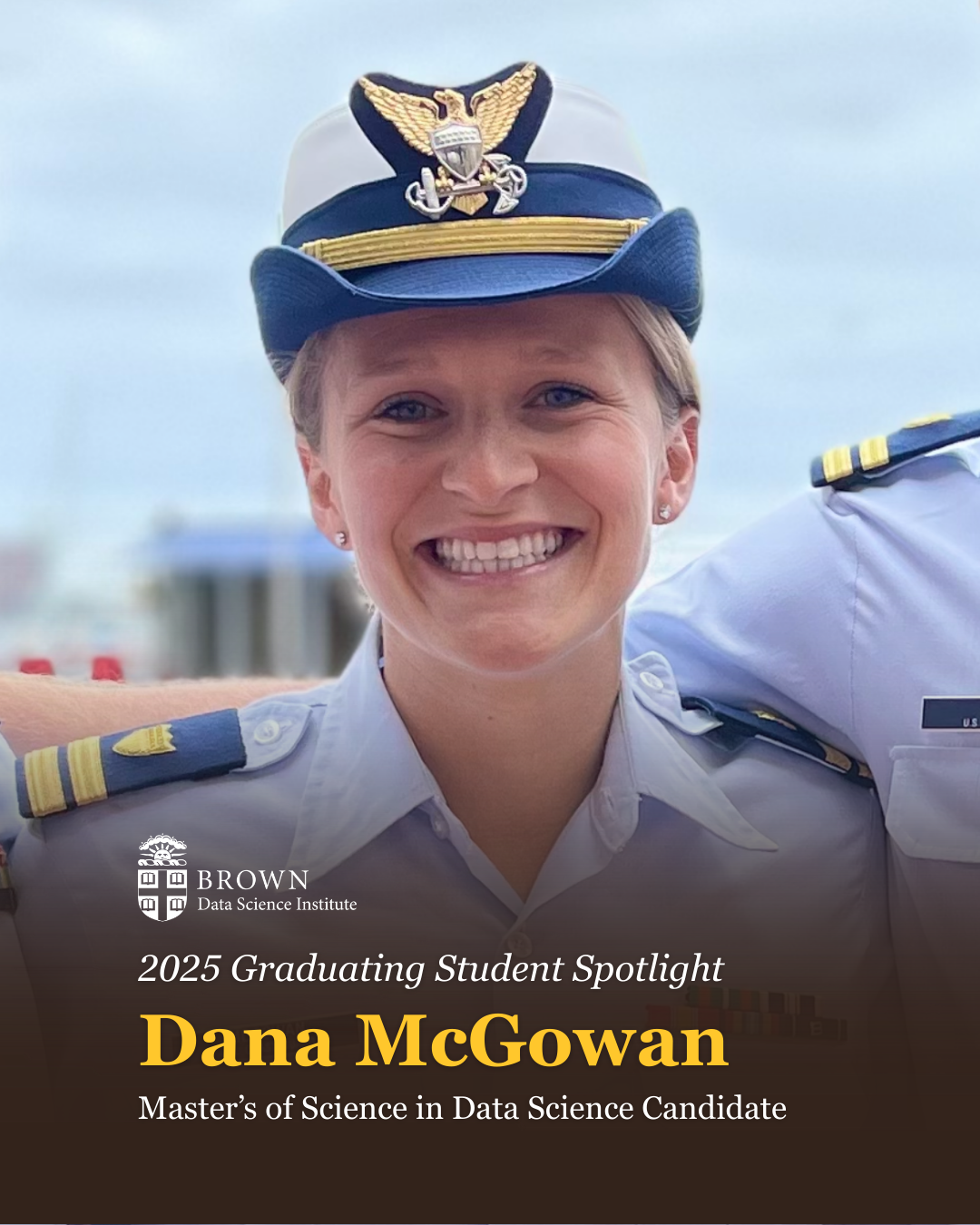
Fields of Interest & Expertise
That's a tough one—I’m not sure I have a definitive answer just yet. One thing I’ve come to recognize through my coursework at Brown is how incredibly talented my peers are. It’s been inspiring. That said, in every group I’ve been a part of, I’ve consistently contributed by making complex data science outcomes accessible and understandable to a wide audience. My experience with the Coast Guard has given me countless opportunities to present and brief technical material, and I think that’s translated well to this field. I’ve found real value in bridging the gap between technical detail and clear communication.
Why did you decide to pursue the Data Science Masters?
I graduated from the United States Coast Guard Academy (USCGA) in 2018, where I studied Operations Research and Computer Science. I loved every part of that program. After graduation, I served as a Deck Watch Officer aboard the USCG Cutter JUNIPER, a 225-foot Seagoing Buoy Tender, for two years. I then transitioned to a planning and logistics role at the Coast Guard district headquarters overseeing operations in New England.
While I learned a great deal in both roles, I missed using the analytical side of my brain every day. In 2021, I applied for the Coast Guard’s continued education program to pursue graduate studies in a math-focused field. I chose Data Science specifically because I’m fascinated by the insights that can be extracted from data. I wanted to equip myself with stronger tools to tackle the growing datasets within the Coast Guard and beyond.
Upon completing this degree, I’ll return to USCGA to teach Operations Research and Data Analytics—an opportunity I’m truly excited about.
How have your academic interests changed over the course of your time at Brown?
I came in thinking I had a solid understanding of what Data Science was. But my time at Brown really broadened that perspective. I now see the wide-reaching impact of data science across so many sectors of society. One topic that particularly grabbed my attention, introduced during a deep learning course in Spring 2024, was the environmental impact of large-scale computational models. It sparked a growing interest in finding more sustainable approaches to machine learning.
What has been your favorite course at Brown?
I really loved Data 1030. It was our introduction to the master’s program and set the tone for the two years ahead. Professor András Zsom, who taught the course, was an exceptional instructor: engaging, clear, and passionate. His teaching made the subject not only digestible but genuinely exciting.
What has been your favorite part of being a student at Brown?
The DSI faculty has been phenomenal. The level of support and encouragement they offer has made a huge difference throughout my experience.
What is a highlight from your curriculum or time at Brown?
One of the highlights was working with Citizens Bank on a project to detect fraudulent checks, whether submitted through the app or in person. It was incredibly rewarding to work on something that has real-world business impact. It also helped me understand the differences between academic research and practical, business-oriented problem-solving, something that will definitely influence how I approach future projects, both in and out of uniform.
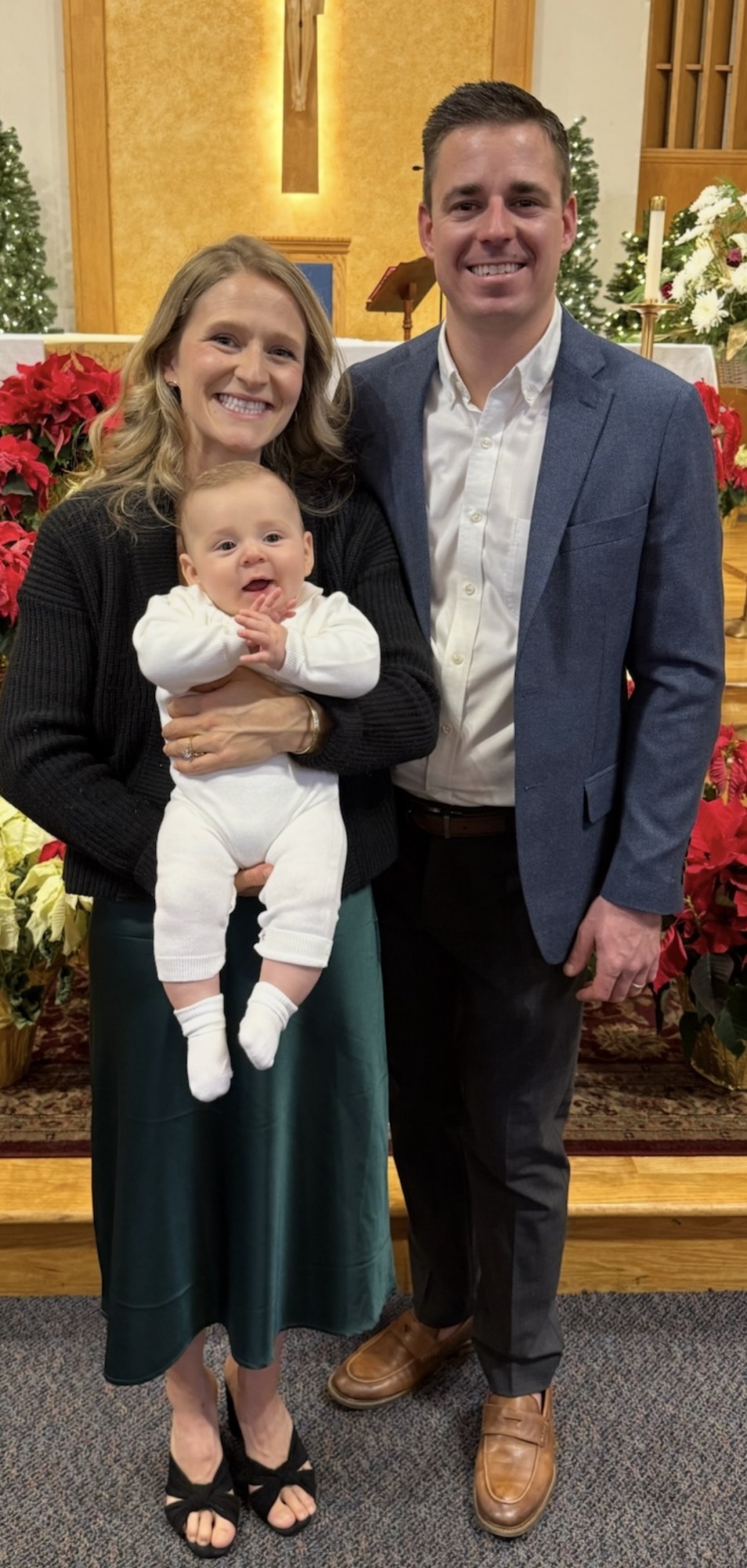 What has been your biggest challenge and your biggest accomplishment during your time at Brown?
What has been your biggest challenge and your biggest accomplishment during your time at Brown?
My biggest challenge, and also my proudest accomplishment, was becoming a mom while pursuing my master’s. I had my first child between the first and second year of the program. Balancing coursework and caring for my son, Crew, has been a true test of time management and resilience, but it’s also been one of the most fulfilling experiences of my life. It’s something I’ll carry immense pride in long after graduation.
Who has inspired you throughout your degree?
I’ve been deeply inspired by my two older sisters and my mom, each of them incredible mothers and hardworking people. Their example has grounded and guided me through this program and into motherhood. I also want to thank my husband, who has been my rock throughout these two years. His support for both me and our son has made this journey possible. And finally, a huge thank you to my academic advisor, Professor Andras Zsom. His guidance and encouragement have meant the world to me.
What is next for you?
After graduation, I’ll report to the United States Coast Guard Academy in New London, CT, where I’ll serve as an instructor in Operations Research and Data Analytics. I’m incredibly excited to give back to the institution that started my journey and help shape the next generation of Coast Guard officers.
What advice would you give to incoming students?
These two years will fly by, make the most of every moment. Brown has a beautiful campus and an incredible atmosphere, so take time to look up from your computer screen and enjoy your surroundings. And most importantly, soak up every bit of knowledge you can, opportunities to learn are everywhere.
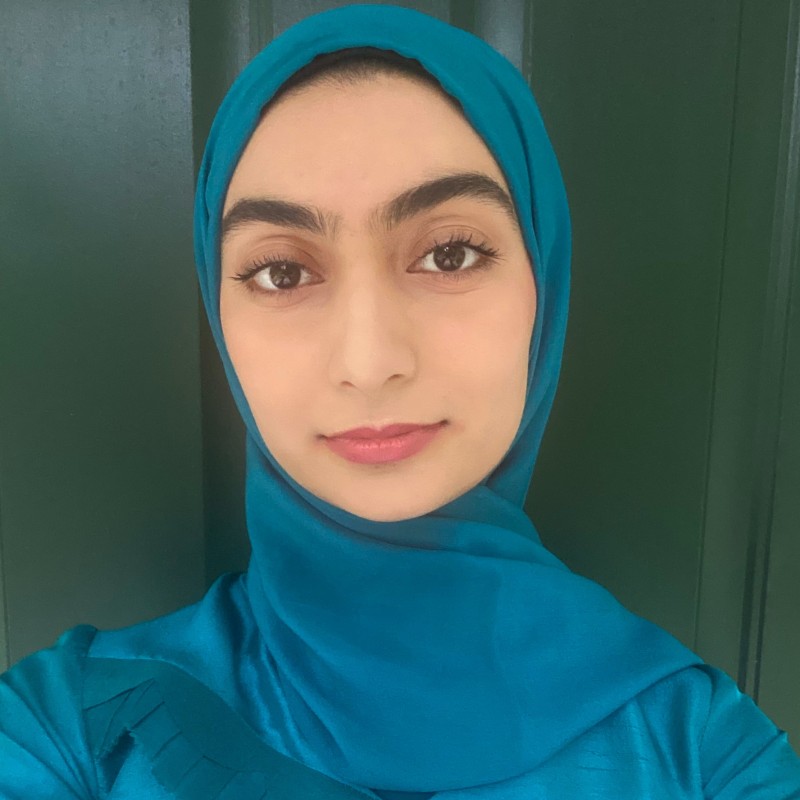 Fields of Interest
Fields of Interest
I'm particularly interested in data science applications to healthcare
What drew you to the field of data science?
I have always enjoyed statistics, and then I learned about data science, the intersection of computer science and statistics, during my junior spring in undergrad. I wanted to learn more about the field, which led me to pursue this degree.
What has been your favorite course at Brown?
I think data engineering was the most interesting to me because it taught crucial skills of data scientists in industry. This course also touched upon the rapid evolution of data science tools and techniques in the tech industry which was also cool to learn about.
What research and extracurricular activities have shaped your experience at Brown?
This past summer, I was a Health Data Science Fellow at the School of Public Health, where I conducted a natural language processing project on reviews of healthcare facilities. This was my first time web scraping and dealing with textual data, which was invaluable and really interesting.
Since the fall, I've been a data science intern at a biotech start-up in the Boston area, where I've been able to get hands-on industry experience with various tools and collaborate with engineers and clinicians.
Lastly, I've been on the executive board of the Brown Graduate Muslim Student Association, which helped establish a great community and connect with people from entirely different academic domains.
What is next for you?
I plan to transition from an intern to a full-time role as a clinical data scientist at my current workplace. I'm excited to grow professionally and apply what I've learned to improve healthcare!
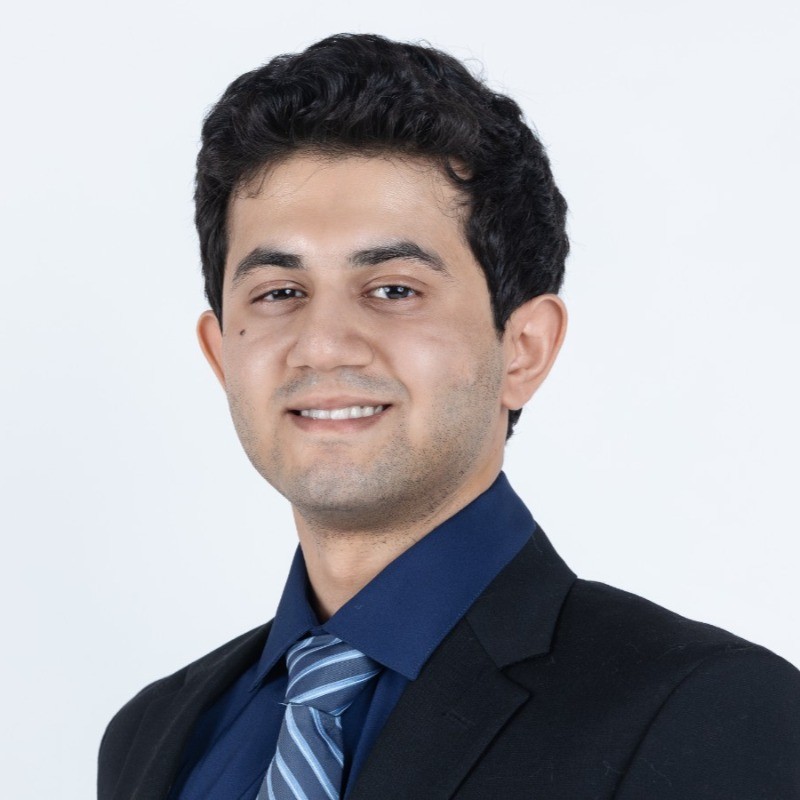 Fields of Interest
Fields of Interest
Fairness and accountability in machine learning
How have your academic interests changed over the course of your time at Brown?
My interests originated from a broad fascination with data-driven methods, and evolved into a passion for leveraging AI to address ethical issues regarding fairness and justice.
What drew you to these fields?
I am drawn to data science because of its foundational relevance across multiple disciplines. During my time at Brown, I wanted to build on the quantitative foundation established during my undergrad while engaging with the ethical considerations surrounding AI deployment. Working with the Center for Technological Responsibility, Re-imagination, and Redesign (CNTR) provided an ideal interdisciplinary research environment that matched this ambition to combine rigorous analytical approaches with socially responsible AI practices.
What has been your favorite course at Brown?
APMA 1690 (Computational Probability & Statistics) taught by Prof. Kun Meng
What experiences have made an impact on your time at Brown?
Participation with campus organizations like the Brown AI Safety Team (BAIST), Every Vote Counts (EVC), and Brown University Community Council (BUCC) has broadened my perspective on AI's societal implications and offered valuable opportunities to collaborate on diverse, impactful projects.
I worked on other meaningful projects during my internships at Lightspeed Commerce and BRAC, where I deepened my technical expertise while grasping the ethical dimensions of real-world data science applications.
Additionally, my research involvements with the CNTR and Watson Institute have strengthened my ability to deliver meaningful, data-driven insights within the context of responsible technological innovation. These multifaceted experiences will inform my approach to future research goals and professional challenges.
Who has inspired you throughout your degree?
I'd like to thank my thesis advisor, instructor, and SRC project collaborator, Prof. Suresh Venkatasubramanian, whose guidance and insights have been instrumental during my degree program. I'm also deeply grateful to Senior Fellow Malika Saada Saar, whose mentorship has profoundly shaped my approach to ethical AI.
What has been your favorite part of being a student at Brown?
I've valued the opportunity to engage with Brown's interdisciplinary community, which encourages collaboration across departments and allows students like myself to explore complex, real-world challenges from different perspectives.
What advice would you give to incoming students?
Be relentless about seeking opportunities outside the classroom.
What is next for you?
I'm excited to be joining TD Bank's Financial Crime Risk Management Department this summer as a full-time data scientist.
.png) Fields of Interest
Fields of Interest
I’ve really enjoyed working across different fields like healthcare, investment and finance, and tech. Exploring these areas through projects and internships has helped me grow a lot and see how data and machine learning can make a real impact. Most of all, I enjoy using what I learn to help others, whether that’s through sharing knowledge or building something useful for the community.
How have your academic interests changed over the course of your time at Brown?
When I first came to Brown, I only had a basic understanding of machine learning. I was just getting started and didn’t know how deep or exciting the field could be. But over time, through classes, research, and working with amazing people, my interests really grew. Now, I love working on NLP projects. I’ve become especially interested in LLMs, LAMs, and multi-agent systems. I enjoy thinking about how these systems interact, learn, and solve problems together. It’s been exciting to go from the basics to actually building things that I used to just read about. This journey has made me even more curious and motivated to keep learning and creating in this space.
What has been your favorite part of being a student at Brown?
My favorite part of being a student at Brown has been the people and the environment. Everyone here is passionate about what they do, and that energy is contagious. I’ve had so many chances to attend events, talks, and workshops where experts share their knowledge and each time, it feels like I’m getting a peek into the deep world of their field. These experiences didn’t just teach me facts, but helped me understand how big and exciting every subject can be. Being surrounded by such a curious and motivated community really shaped how I think and learn.
What has been your favorite course at Brown?
It's hard to pick just one, but I definitely loved Hands-On Data Science (DATA1030) with Andras Zsom, Computational Linguistics (CS1460) with Ellie Pavlick, and Fairness in Automated Decision Making course (CSCI1491) with Suresh Venkatasubramanian.
Who has inspired or mentored you throughout your degree?
Professor Andras Zsom has been a big inspiration during my time at Brown. His class was the first one I took, and I really enjoyed it. Later, I became a teaching assistant for that course, and also worked as a research assistant with him. What made Andras a great mentor for me was how easy he was to talk to. He was always my first contact whenever I needed help, whether it was about classes, research, or just advice about what to do next in my career. He guided me through picking the right courses and helped me think clearly about my future plans. We also had fun and interesting conversations, from deep learning to food from different cultures. I’m very thankful for his support and mentorship.
What advice would you give to incoming students?
Brown has so much to offer, so my biggest advice is to come in with a goal but don’t be afraid to explore and be flexible in changing that goal as you learn more. Try different classes, talk to people, go to events, you never know what might inspire you. At the same time, remember how special this opportunity is. You’ll be surrounded by some of the smartest and kindest people you’ll ever meet. There’s a lot to learn here, both inside and outside the classroom, and also a lot of fun to be had. Take it seriously, but enjoy it fully.